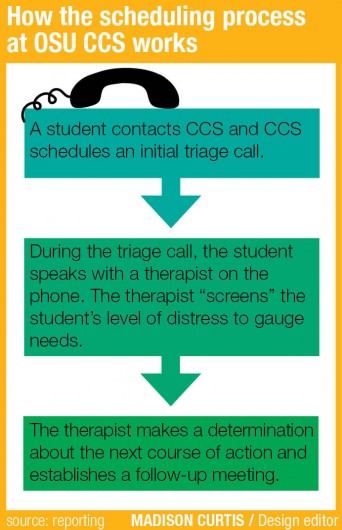When one Ohio State student lost a parent last year and found herself dealing with grief and anxiety, she decided to seek out counseling.
At her boss’ suggestion, the fourth-year female business student, who wished to remain anonymous because she wanted her counseling experience to remain private, decided to look into the services available on campus through the Office of Student Life’s Counseling and Consultation Service.
So in October, she called CCS to make an appointment.
“I was especially nervous for my first meeting,” she said. “It was a situation I have never been in before so I didn’t know how to act, but after first couple (meetings) with my counselor it became more natural.”
CCS provides up to 10 free counseling sessions, available in its main office on the fourth floor of the Younkin Success Center.
Two of the services students can attend through CCS are weekly drop-in workshops or one-on-one appointments with a therapist.
Micky Sharma, director of CCS, said the majority of OSU students who seek counseling meet with their therapist between five to six times. If students need more continuous services outside of the 10 sessions, he said CCS tries to direct students to other therapists in the community who can better meet their long-term needs.
In addition to scheduled sessions, Sharma said CCS maintains open urgent appointments for students who have an emergency and need to see someone immediately.
Sharma added that over the course of the last academic year, CCS had more than 600 requests for urgent appointments.
“All were contacted within less than 24 hours,” he said.
In January 2013, CCS switched to a “triage” model, which evaluates patients on the phone before scheduling appointments in order to decide how severe a patient’s need for treatment is, which Sharma said has helped.
“Sometimes students will call in and will not say when they’re in a state of high distress when they actually are,” Sharma said. “This chat with them gives us a good sense of what they need.”
Sharma said the switch to the triage model also helps screen students and arrange their appointments faster.
“The time it takes to schedule an appointment varies depending on where we are during the academic year,” he said. “As we get into busier points of the academic year, there would be about a two- or three-week wait.”
Sharma said typically CCS isn’t busy at the start of Fall Semester but gets busier after that.
Sharma also said CCS is currently looking to fill five positions on staff.
While two of the available positions are considered “generalist,” CCS is specifically looking for therapists with expertise in eating disorders, men’s issues or psychological assessment. For the third position, Sharma said CCS hopes to hire a care manager, which is someone who collaborates with local entities like Harding Hospital or off-campus mental health providers for students to help students who are struggling with mental health issues.
Sharma said for the other two positions, CCS hopes to hire therapists who can provide care for two diverse communities of OSU’s campus, namely speakers of Spanish and Mandarin Chinese.
“One of the things we aspire to in this center is to be very multiculturally competent and sensitive and we understand that we need to have staff here, clinicians here, who represent our entire student body,” Sharma said.
CCS also offers group meetings, workshops and “Let’s Talk” drop-in sessions at the Office of International Affairs in Oxley Hall and the Office of Military and Veterans Services in the Student Academic Services Building, locations that are outside of Younkin Success Center.
Carolina Alvarez, a third-year in animal sciences and resident adviser on campus, said she was happy to hear CCS has services outside of Younkin because some students are wary of going into the center.
“A lot of students benefit from CCS but as an RA, I’ve noticed that there are many residents that could benefit from (counseling) but don’t because they are scared to,” Alvarez said.
Alvarez said some students are intimidated by the process or get discouraged at having to wait for appointments, but she said she’s successfully recommended other CCS resources.
“I’ve sent many residents to the group sessions, which they seem to really like. They are always really nervous at first, but the sessions are a great alternative,” Alvarez said.
Alvarez said, though, there is a “pretty big negative stigma” associated with seeking counseling in society. She said it can take a lot of courage for students to call in and ask for help when they are facing anxiety, depression or other mental or emotional challenges.
For Sharma, that stigma is often an obstacle CCS is working to overcome.
“(Mental health) can be as equally important as the way (we) treat medical issues or checkups,” he said. “My hope is that as we move forward in time, we are able to can increase our resources and increase the staff in our area to best meet the needs of students on campus.”
The fourth-year student said she can attest to that, as her counselor helped make her feel comfortable and has been willing to “fit her” into her schedule the four times they have met so far.
“I feel so much better after I talk to (my counselor). I think it would help so many people, too,” she said.
Tessa DiTirro contributed to this article.



